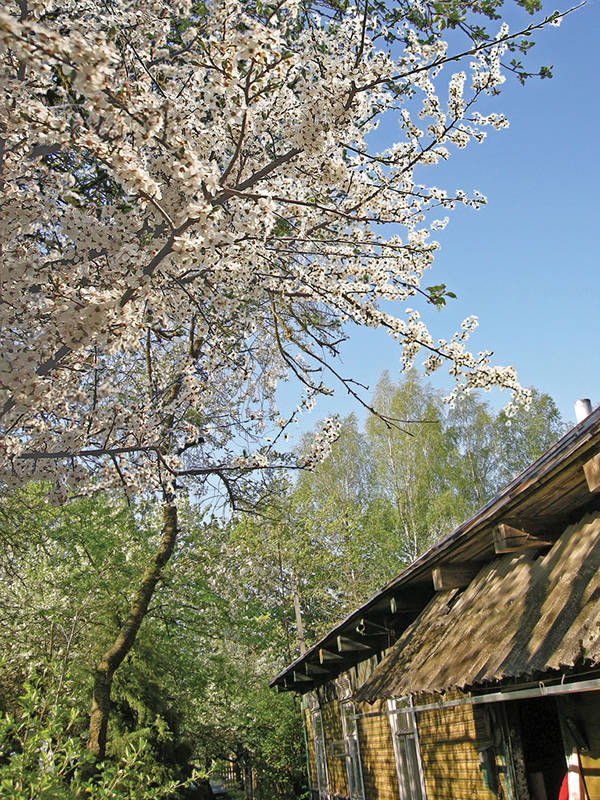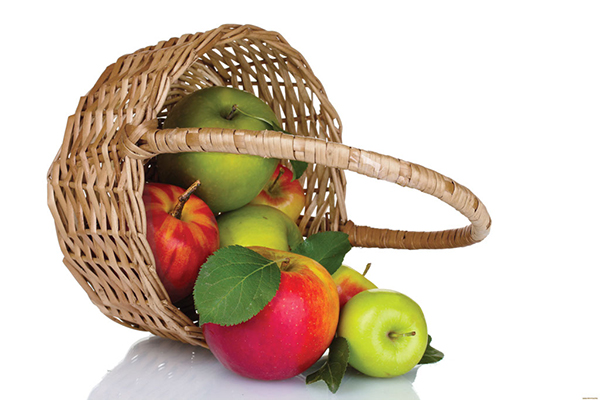This village of Bratkovichi in Kostyukovichi District of Mogilev Region doesn’t exist anymore. In the aftermath of the Chernobyl accident, the area became contaminated with radioactive nuclides, and its inhabitants were relocated from the area. Now, the village is only present in people’s memories.

How does a human soul choose its place to live on the Earth? It is a mystery. My village, Bratkovichi, fell victim to the Chernobyl tragedy. The disaster forced us, the inhabitants, to leave our homes. What is left to us are only memories of years-long life in the village; the place where I was born and grew up. There, my soul had inherited an immeasurable treasure, which filled me with kindness and beauty, enough for my entire life.
We lived in Randa Street. Children would gather there to play, and that was a happy time. We’d run in the meadow or play by the river, or walk through the beautiful oak forest. We never felt sad, for each season would bring its own joys and delights. We were happy in spring, when slender birch trees would put on their green kerchiefs, in summer when the meadow behind our garden would bloom. Not far from the meadow there was a river and, farther away, oak woods grew upon a hill. Both children and grown-ups would gather by the river; the air ring with joyfulness, the birdsong of leden and larks. Then, autumn would enchant us with its immense riches in gardens and orchards. I remember juicy apples tempting me to pick them. Trees and bushes would delight my eyes with their red and golden outfits. In mushroom time, I’d head to the oak forest, taking our small, bear-like dog. He’d hunt chanterelles, digging them out with his paws in such a way as made me laugh. It was always quiet in the forest, with only the whispering sound of leaves, seeming to imbue a sense of fairy tale magic.
My parents taught me to respect people of labour. My father told me once that the Homeland starts with a grain seeded in the furrow. I felt special respect towards farmers. Once, I was watching a group of women gathering hay. They were beautiful — suntanned, in their light dresses with floral patterns. Working as a team, I could hear them joking and laughing. It seemed that the women were part of nature and the harvest, and the sun was shining brighter for seeing the beauty of their laughter, and kinship in labour. Yet, this image seems so long ago.
My mother was a teacher at Bratkovichi Grammar School. From childhood, I liked the idea of learning, as my mother would often tell me stories about her schooling, teachers and pupils. Her eyes would shine with enthusiasm when she was narrating, as she loved those open-hearted people who knew both how to work hard and how to have fun. In summer, as evening approached, we would gather in the street. I was pleased to hear women singing and admire the silvery dew sparkling in the meadow, and to sense with my entire body the earth going to sleep. Violets emanated their scent into the night air. My mother seemed always nearby. Her name was Maria Ivanovna Avkhocheva.
My mother also led amateur talent groups in Bratkovichi. Teachers, schoolchildren and our fellow villagers were excited to present their talents on stage. Lovely performances delighted both audiences and fellow artists, many of whom were truly gifted. I still remember a young accordion player who would always rock the stage! One of the villagers was awarded an honorary diploma from the BSSR Culture Ministry, and that prize was well-deserved. At school, we had a very good orchestra that acted like a well-organized team. I still have memories of the wonderful music, borne from honest, soulful musicians, playing so generously, touching our young hearts.
Bratkovichi citizens knew how to celebrate holidays. For instance, my friends and I would long for Easter. My mother would sew us new dresses for the holiday and my soul would sing with joy. I felt like the pure spring-swelled stream; running, swirling, and rushing along.
School years were the sweetest part of my life. My mother was first teacher to my elder sister and to my brother, and myself. Though I now recollect it with a smile, it was hurtful at first that my mother would show affection for all her pupils, not me alone. Then, I got used to it. In primary school, my mother opened us to this wonderful world, so full of beauty. Have you ever felt mother love from a teacher? I used to be wrapped in it! During breaks, we’d play in the school-yard. At upper school, we found each subject to be interesting. We liked and respected all the teachers.

I will always remember that fairy-tale place; the school seemed a wonderful palace, where the teachers were kind-hearted and smart wizards, astonishing us children with daily miracles of learning. During the long break or after classes, we’d run to the oak forest, that gorgeous realm of nature. Each part of school life had something special to offer: during classes, or school garden works, and at school parties, where we girls looked so attractive. We were glad to see the boys peeking at us. We wanted to look like young teachers.
I have memories of first love there; such a tender feeling. Memories of young men giving flowers, and being ready to swim to the middle of the river, where a white lily grows for you, and all the while he is admiring you, not the flower. It brings to mind a verse by Maxim Bogdanovich:
You only see the beauty,
A lovely woman’s face
A golden plait,
And blue eyes.
Now that I’ve grown older, it seems to me that we were happy just because we possessed that great treasure: youth. We were happy because we loved and because everything around was flourishing — the meadow, the oak forest and garden. Our dear and lovely teachers not only taught us various subjects, they taught us how to love our Motherland. We were ready, if necessary, to defend every single tree, every single shrub, and our parents’ old house — everything that constituted our Homeland.
However, how could we defend what was dear to us when the enemy was invisible? The radiation invaded our home village. We leaned towards the light and kindness as a small seedling leans towards the gentle sun and wind, unaware that it might encounter the cold and frost and that a human could do grave and senseless harm to it.
Perhaps it’s good that during those idyllic school years, we knew so little about grief and sorrow. That is why I will always remember my school years as the best time of my life.
Right after I finished school, I became seriously ill. When I recovered, after hospital, I studied at a university in Moscow. However, I never graduated, because of severe health problems. For some time, I lived and worked in Minsk. Living in the big and busy city, however, did not suit me and, following the advice of doctors, I returned home. I worked in my village and stayed at hospitals and health retreats from time to time. Once, I was literally between life and death. At that moment, I only wished to see my Bratkovichi once more, to visit my home, to sit in my garden, to walk by the river, to go to the oak forest on the hill near the rye field, to lean against my mother. I wanted her to stroke my head, as in childhood. I longed for it as one might long for a sip of water in the heat.
My soul and my heart continue to yearn for my home village. But my mother will never meet me on our home porch, nor will she ever warm me with her love again. Several times, I had the opportunity to visit my village, now in the excluded zone, during the Radonitsa festival. I wanted to kiss my dear land, to bow to the memory of it, in both happy and uneasy hours. My fellow villagers would hug and chat, but always it was not enough. Our land seemed still to radiate some special warmth. It seemed that it did not want to let us go.
Now, I cannot visit my home village — it has disappeared, as has the house. The place where Bratkovichi was located can hardly be recognized. Yet, my small Homeland, now abandoned, remains dear and near to me. I understand so well the Russian officer from the famous song, whose love for Russia was so great that, when challenged to a duel abroad, said: ‘Oh, gentlemen! I wish I dueled amidst my dear birch trees!’ Similarly, I should say that I’m so glad to have had Bratkovichi in my life; with its white birches, bird cherry trees, blooming meadow, my parents’ house and my school.
It is mysterious to contemplate what strong power the natural world has over a human being. Nature inspires artists, writers and musicians. You listen to a song and imagine birches rustling on a river bank. You see the starry skies and hear trees whispering. All that is left now is the memory of my original home, where a part of my soul and heart will stay forever.
I’m looking at photographs: my former teachers, their pupils, my classmates. A journey to the past is both joyful and sad. I am holding the remnants of the valuable past in my hands. It was so hard to part with our village and relocate. It seemed that even the trees in my orchard were upset, the bushes bent down, the water in the river gone black, the odorous lilac faded.
Some of the people I knew have passed away. When relocation began, my mother died, and then my brother, who lived in Minsk, also passed away. My sister lived in Ukraine. After I moved to the settlement of Shareiki (now an agro-town) I experienced some hard times, in all respects. My anemia aggravated and I even fainted once. In my faint, I saw a shining palace and a beautiful blue background in front of my eyes. I felt as if I were dead. It was an interesting experience. If the human soul is immortal, it bears responsibility for our deeds. Sadly, some people choose to do evil in their short earthly life. Some dare devastate that created by others. Looking into myself, I feel that my heart wants to live in harmony, kindness and beauty. Meanwhile, the antagonistic clash of good and evil in humanity continues.
Life is a mystery. What power does it have? What makes us love it and long for love even when living is hard? What makes us strive for life as snowdrops strive for light and warmth, growing out of the snow despite all calamities? Everyone has their own ideas about the sense of life and our vocation on Earth. Some say that life is senseless. Some compare it to a sunray that sparkles for an instant amidst the clouds to disappear again. No sense, no use.
Maybe life is just about finding the ability to be happy about this lovely moment of living itself. Maybe it is about living your life decently? When you look at a blooming meadow, you don’t see individual flowers, yet every single plant is part of the meadow’s beauty. I wish every person aspired to behave as such a flower. Then, perhaps, life and the world would be different — kinder, happier, more beautiful — like my Bratkovichi, that will stay with me forever.
By Nina Gavrilenko,
Shareiki agro-town Kostyukovichi District, Mogilev Region











